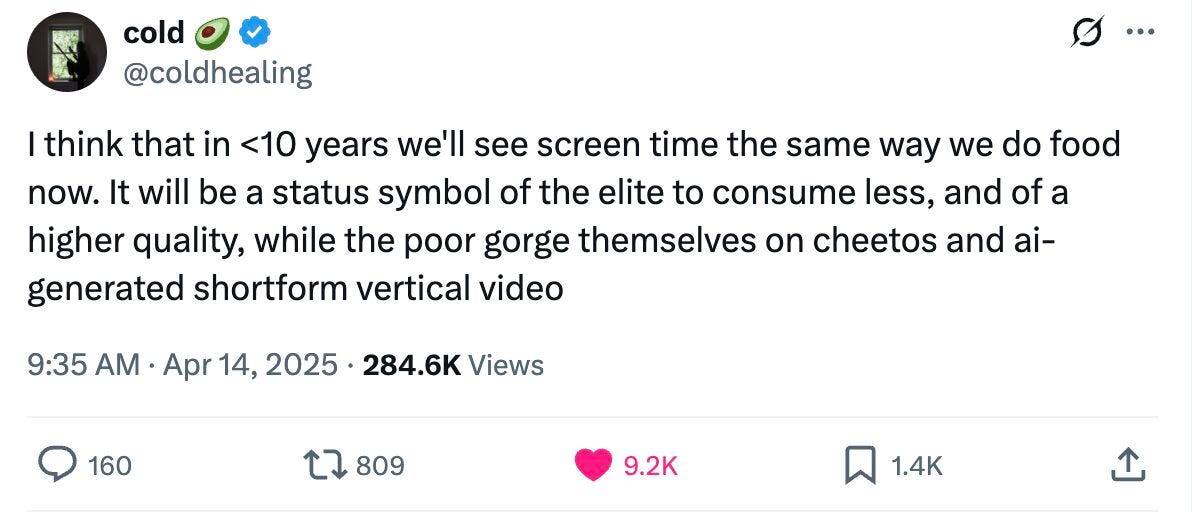I Found a Startup Selling "Black Mirror" Style Tech
It's valued at $120 million and is founded by a pair of 21 y/o Columbia dropouts.
Through someone's LinkedIn post, I found Cluely1: "an undetectable AI that sees your screen, hears your calls, and feeds you answers."
Supposedly, Cluely is designed to integrate with your gadgets in the most invisible way so it can seamlessly give you "Everything You Need. Before You Ask."
The company calls it the "turning point of thought." It will run in the background, continuously seeing your screen content and listening to your audio. It sees what you see, hears what you hear. It's completely undetectable. And it works everywhere, with more platforms being added to their roster of integrations.
As I was going through the website's pitch, I remembered the "Black Museum" episode of Black Mirror, where Rolo Haynes, the owner and curator of a museum that features experimental technology, tells the tragic backstories of various exhibits.
Rolo relates the story of a couple named Jack and Carrie. Carrie is hit by a truck and becomes comatose. Rolo approaches Jack to offer a "solution."
Now, I'm going to paste an excerpt of the actual dialogue here, because it’s so important for you to see it:
Rolo: "The guys at TCKR have been working on digitally extracting a consciousness out of one brain, and kind of rehousing it in a host brain."
Jack: "What does that even mean?"
Rolo: "So, even on a good day, we only use 40% of our brain capacity. There's this whole other 60% of our noggin hanging around like an empty Airbnb."
Jack: "And so..."
Rolo: "And so with our new compression technique, we figure we can fit another whole consciousness into that unused space."
Jack: (Silent)
Rolo: "I'm talking about taking Carrie's consciousness from that broken shell (gestures to the comatose body of Carrie) and putting it in there (points at Jack's head)."
Jack: "Um... Like a voice inside my head?"
Rolo: "Like the whole of her inside your head."
Jack: (Silent)
Rolo: "Like a hitchhiker. Like a passenger. Vicarious sensations. She sees what you see. She feels what you feel..."
You know that feeling when you're witnessing something and you're seeing where it goes and you just know it's a BAD idea? (“Don’t do it! You shouldn’t do ittt!” But of course, they always do it).
That was the feeling I had watching this Black Mirror scene. And it's the same creeping feeling I get reading through Cluely's pitch.
"An undetectable AI that sees your screen, hears your calls, and feeds you answers"
The unfunny thing is the fact that this is a serious business pitch from a legitimate AI business. The service charges $20/month and $100/year. Obviously, for such high tech offer, that amount is not enough to be profitable. What they’re really aiming for is “mindshare,” which is a marketing term referring to the amount of consumer awareness or popularity surrounding a particular product, idea, or company.
They want to get enough folks using it so that when AI becomes truly advanced enough to deliver all the high-tech things they’re promising, they already have people’s minds locked in.
Support independent and fresh insights on creativity, the creator economy, AI, and literature. This is a one-person operation. Subscribe for free or upgrade your subscription to support me below:
Now. Even if this were actually a good idea… What would you use it for in the first place?
Cluely AI is originally designed as a “virtual companion” that “knows everything about you.” The reason it’s created to be undetectable is so it can listen to sales calls, presentations, negotiations (even casual dates), and help the user “cheat” by feeding them real-time answers that get them the result they want.
This technology touted as “the turning point of thought,” and has raised $15 million in venture capital (with an inferred valuation of about $120 million), isn’t there to help cure cancer or solve poverty or alleviate the climate crisis. Instead, it helps users “cheat on everything”: ace job interviews, lie convincingly to woo a date, negotiate sales better, and help knowledge workers do more and finish more and be more productive so their companies can keep up with the ever-rising demand for more and faster “solutions.”
"Your Prize for Saving Time at Work With AI: More Work."
That’s the headline of a recent Wall Street Journal article.
The question now is whether we get to keep the hours we save, or whether the reward for working faster is just more work. The article says it well:
“Unless finishing early comes with extra downtime or other gains, the real beneficiaries are likely to be businesses looking to squeeze more productivity out of their teams."
Amazon CEO Andy Jassy recently urged employees to "figure out how to invent for our customers more quickly and expansively, and how to get more done with scrappier teams" using AI. The message from him and other business leaders: we can't simply do as much work as we've been doing, in less time, and clock out early. Instead, we must keep increasing the output as we do most things faster.
Office workers are notorious for “productivity theater”: browsing Zillow while pretending to work, trying to look busy even when they’re already done. And understandably so! If you’re done with what they paid you for, you should be able to relax! But businesses and managers don’t want that, of course. It’s a conflict of interest.
Others use their extra free time to work on a side hustle. And no wonder they do. With the rising costs and the lower salary offers, a single job or income stream is no longer enough to sustain a decent life for most people!
This applies even to independent creators. There’s so much noise now that one has to create more content, repurpose in more platforms, post more, just to be heard. Inevitably, creators are forced to use AI just to keep up.
This is what the AI hype is for? This is the "turning point of thought?"
Despite what all these AI prophets say, Cal Newport, author of "Slow Productivity," correctly points out that history is not on employees' side when a machine starts taking peoples’ jobs.
"New technologies that speed up aspects of knowledge work tend to just lead to faster-paced knowledge work," he says. "The advent of PCs and email to the office, for example, led only to explosions in the average employee's workload."
For anything to change, workers might first have to be pushed to their breaking points. Companies will respond if their AI productivity drives backfire. Maybe.
The most ironic thing about this all is the fact that all this AI hype isn’t really solving real problems.
Why should we obsess about getting so productive anyway?
Most of these AI companies are there to help people who want to get more leads. People who want to automate their income generation process. Or create AI-generated content that is fed to a tool that automatically posts these human-sounding AI slop on social media to gain more followers and potential customers.
This reminds me of that Al Jokes TikTok video. In it, a scientist approaches his boss:
"Sir, I may have just found the cure to cancer."
"Oh my god, really?" the boss responds.
"Yes, it is confirmed. Our product can now cure cancer."
"Alright, and what problem are we solving?"
The scientist is confused. "We're curing cancer."
"No, I know. That's fine. Whatever. What's the second problem?"
The boss then explains:
"If you're gonna be a successful American company or industry that sells a solution to a problem, your solution must also create new problems that you can sell the solution to."
 Tiktok failed to load.
Tiktok failed to load.Enable 3rd party cookies or use another browser
That's exactly what we're seeing with AI productivity tools.
They solve one problem: help you work faster. But they create a second problem: now you have to work even more to justify your existence. You prove your worth by getting more done, so you funnel more of your meager income (or your company simply deducts it from your salary) toward AI tools that give you an edge.
This isn’t conjecture anymore. A few days ago, Microsoft confirmed it was laying off 9,000 workers as it invests heavily in AI. This happens after it reported profits going up 18% last April.
I once saw a post about how being online will be the next thing elites will afford NOT to do.
The “new middle class” (which will be euphemism for the majority of poors, as the poors become the new average) will be forced to post more and engage on more content to get the projects and jobs they need. And the rich will want to be disengaged while staying informed and influential.
Generative AI is a winner-takes-all economy.
Ironically, as we use AI more because the job and gig markets demand it, we help AI companies create even smarter and better machines. We're essentially building a library of human expertise that companies can access for a fraction of the cost of actual humans.
In the end, we're solving the wrong problem.
Instead of asking how we can do more work faster, maybe we should ask why we need to do so much work in the first place. Instead of celebrating tools that help us "cheat" our way to success, maybe we should question a system that makes cheating feel necessary.
But I guess that's a harder problem to solve. And unlike AI tools, this problem doesn't come with a profitable second problem.
Get independent and fresh insights on creativity, the creator economy, AI, and literature. This is a one-person operation. Subscribe for free or upgrade your subscription to support me below:
I’ve linked an archived version of their website since they’ve tweaked some of their wording now. You can check their updated website here.







